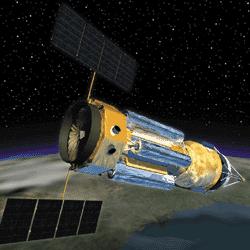It is difficult today to recall the anxiety that shook America when, fifty years ago, Sputnik pierced the atmosphere. "No event since Pearl Harbor set off such repercussions in public life," University of Pennsylvania historian Walter A. McDougall has observed. Sputnik was the starting gun for a desperate, urgent race between the United States and the Soviet Union for space superiority -- and the military advantages it might confer -- which would consume billions while leaving neither nation safer. These days, the phrase "space race" seems antiquated, an almost quaint relic of a bygone era. But behind the competition to put a man on the moon lay a deadly serious race for military superiority. This pursuit of the next military high ground is alive and well. Last year the administration quietly released a new National Space Policy, the first revision of America's space policy in a decade. The doctrine rules out "the development of new legal regimes [that] limit U.S. access to or use of space" and asserts the right to deny adversaries of space capabilities "hostile to U.S. interests."
50 Years After Sputnik, Are We Headed for the Next Space Race?

